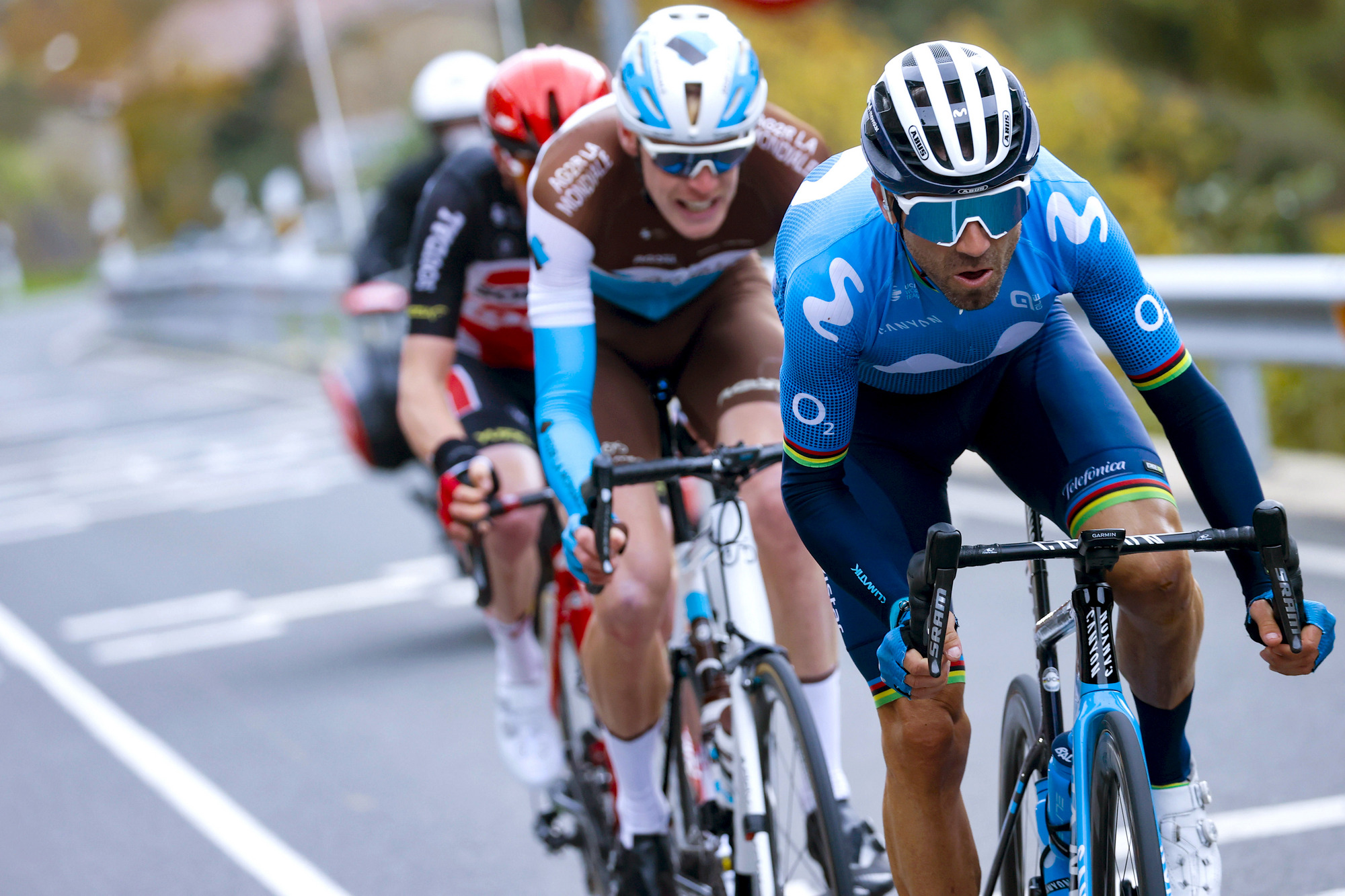Alejandro Valverde roars back in action at Vuelta a España
Spanish veteran in key long-distance break of day

Never rule out Alejandro Valverde. The Movistar veteran may be in his fifth decade and despite fluffing his lines in the battle for the stage win, Valverde’s aggressive performance on Tuesday has now moved the Vuelta a España’s oldest rider back into the overall general classification battle as a distant, but real threat to overall leader Richard Carapaz (Ineos-Grenadiers).
Eleventh on the opening stage to Arrate, where the 40-year-old won in 2012, and up to Tuesday’s stage 7, Valverde has been more thereabouts than right there in the Vuelta’s first week, sliding to three minutes down on Carapaz.
But on the first of two ascents of Tuesday’s main climbing challenge, the first category Alto de Orduña, Valverde moved across to the massive break of the day and was rarely out of the action from thereon, forming part of a three-man move for 20 kilometres mid-stage, coming within seconds of being provisional race leader on the road. Then, as the gaps shrank, he jumped across to Michael Woods (EF Pro Cycling) when the Canadian attacked.
Subsequently third behind Woods at the finish, Valverde’s margin of almost a minute plus a four-second time bonus on the main favourites has placed him back in ninth overall, and as teammate Enric Mas told Spanish TV after the stage, “it makes him an extra card to play in the GC battle.”
“We’ve got three of us now at two minutes or less - myself, Marc Soler and Alejandro and he’ll be another option on the crucial stages to come,” observed Mas, now fifth overall at 1:07. “Ten out of 10 for how Alejandro rode the stage.”
After the stage, Valverde commented about coming close to a stage victory. “I wanted to win but everybody in the break was watching my wheel the closest, and that makes it harder.
“I was up there in a possible support role, too, to see if any of my teammates [Mas and Soler] bridged across from the main group.”
The latest race content, interviews, features, reviews and expert buying guides, direct to your inbox!
The icing on the cake for Valverde would have been the stage win, but Woods had the better of him. Or as Valverde put it, “I let one of the guys in the break out of my sight and that was some guy I let do that.”
His objectives in the break were multiple in any case, he said, partly to force the rival GC teams to work behind, partly to go for the stage win and partly as the spearhead of a possible attack by Mas and/or Soler. He also had words of thanks for his two teammates, José Joaquín Rojas and Carlos Verona, for their hard work in the break, which saw the Spanish veteran briefly come within a handful of seconds of the overall race lead on the road.
“This year’s Vuelta is all out every day,” observed Valverde, who first rode the Spanish Grand Tour back in 2002. “And it offers lots of opportunities. We’ll try to make the most of them.”
Valverde’s presence in the break had some interesting side effects, too. It was one factor that forced Ineos-Grenadiers to chase hard from behind, stripping down Caparaz’ support to just Andrey Amador by the second ascent of the Orduña. In the plethora of mountain stages to come, it would seem that the Ecuadorian leader risks being isolated.
It remains to be seen if, after his uneven first week - and both his and Movistar’s season to date - Valverde has re-encountered enough of his former strength to remain with the favourites in the set piece mountain stages to come, starting on Wednesday’s ultra-difficult ascent of the Moncalvillo.
But no one will have forgotten either that Valverde was a solid second overall in last year’s Vuelta at age 39, or that the Vuelta is the Grand Tour where he has traditionally been at his best. And perhaps most crucially of all, no one will have forgotten that with Mas and Soler as Movistar’s main GC challengers, Valverde has the most freedom of the Movistar trident to maneouvre, and, with 127 wins in his palmares, the least to lose.
Alasdair Fotheringham has been reporting on cycling since 1991. He has covered every Tour de France since 1992 bar one, as well as numerous other bike races of all shapes and sizes, ranging from the Olympic Games in 2008 to the now sadly defunct Subida a Urkiola hill climb in Spain. As well as working for Cyclingnews, he has also written for The Independent, The Guardian, ProCycling, The Express and Reuters.
